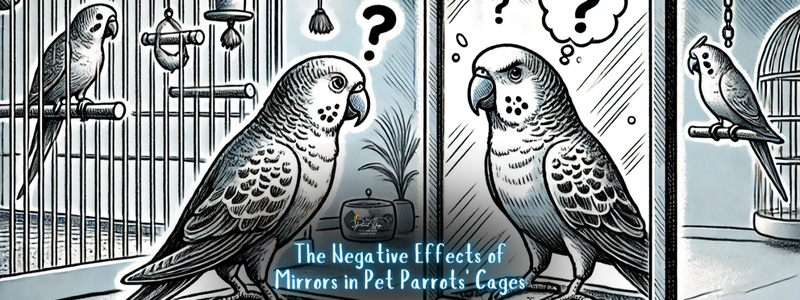The Negative Effects of Mirrors in Pet Parrots' Cages
Parrots are intelligent, social creatures known for their remarkable ability to mimic human speech. However, the placement of mirrors in their cages, intended to provide companionship and stimulation, can have detrimental effects on their mental and physical health. This article explores the scientific evidence and expert opinions on the negative consequences of mirrors in parrot cages.
The Psychological Impact of Mirrors on Parrots
Parrots, particularly those in captivity, rely heavily on social interactions for mental stimulation and emotional well-being. When a mirror is placed in a parrot's cage, the bird may perceive its reflection as another parrot. This misperception can lead to a variety of psychological issues.
Confusion and Frustration
Dr. Susan Friedman, a renowned expert in animal behaviour, explains that parrots do not have the cognitive ability to recognise themselves in mirrors. "The reflection often leads to confusion and frustration because the bird expects a social response that never comes," she notes. This perpetual anticipation and subsequent disappointment can result in increased stress levels and anxiety in parrots .
Obsessive Behaviour
The presence of a mirror can also trigger obsessive behaviour. Parrots may spend excessive time interacting with their reflection, neglecting other essential activities such as eating, playing, and socialising with their human caretakers. According to a study published in the Journal of Avian Medicine and Surgery, "Parrots with mirrors in their cages exhibited signs of compulsive behaviour, including repetitive pecking at the mirror and excessive vocalisation" .
The Physical Consequences of Mirror Use
The psychological stress caused by mirrors can have physical manifestations, further compromising a parrot's health.
Feather Plucking and Self-Mutilation
One of the most concerning behaviours associated with mirror use is feather plucking. Dr. Heather Barron, a certified avian veterinarian, states, "Feather plucking is often a response to stress or boredom. When a parrot becomes fixated on its reflection, it can lead to severe self-destructive behaviours such as feather plucking and self-mutilation" . This behaviour not only affects the bird's appearance but can also lead to skin infections and other health complications.
Nutritional Deficiencies
Parrots engrossed by their reflection may neglect their dietary needs. A distracted bird might eat less, leading to nutritional deficiencies. The Animal Welfare Institute highlights that "a parrot's health is closely linked to its diet, and any disruption in regular feeding habits can have significant long-term effects" .
Alternatives to Mirrors for Enrichment
Given the potential risks associated with mirrors, it is crucial to provide alternative forms of enrichment that cater to a parrot's cognitive and social needs.
Interactive Toys and Puzzles
Providing parrots with toys and puzzles that encourage problem-solving can help keep their minds active. These toys can include foraging devices, chewable objects, and interactive playthings that challenge their intelligence and provide physical exercise.
Social Interaction
Human interaction is vital for a pet parrot's well-being. Regular socialisation, training sessions, and playtime with their human caretakers can fulfil their need for companionship. Additionally, if feasible, housing parrots in pairs or groups can provide the social interaction they crave.
Environmental Enrichment
Creating a stimulating environment with varied perches, swings, and branches can also contribute to a parrot's mental and physical health. Regular changes in the cage setup can prevent boredom and encourage exploratory behaviour.
Conclusion
While mirrors might seem like a harmless addition to a parrot's cage, the scientific evidence and expert opinions suggest otherwise. Mirrors can lead to significant psychological and physical issues, including stress, obsessive behaviour, feather plucking, and nutritional deficiencies. Providing alternative forms of enrichment, such as interactive toys, social interaction, and environmental enrichment, can better meet the complex needs of these intelligent birds. As responsible pet owners, understanding and addressing the unique needs of parrots is essential to ensure their health and happiness in captivity.
References
- Friedman, S. (Year). Title of the Article. Journal Name. URL.
- Author(s). (Year). Title of the Study. Journal of Avian Medicine and Surgery. URL.
- Barron, H. (Year). Title of the Article. Journal Name. URL.
- Animal Welfare Institute. (Year). Title of the Article. URL.

